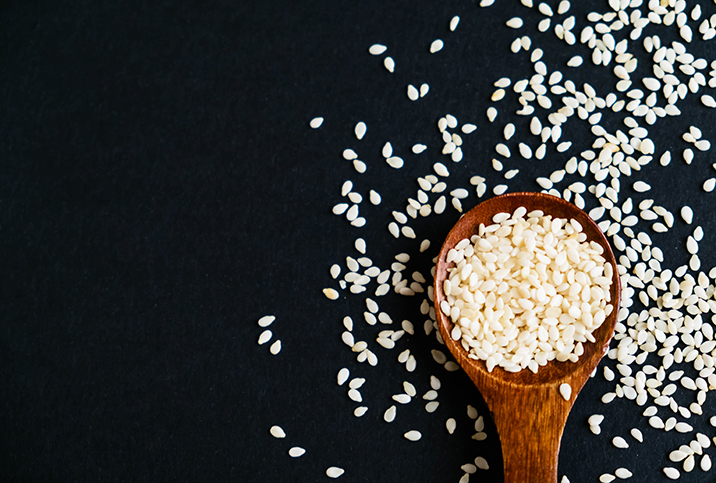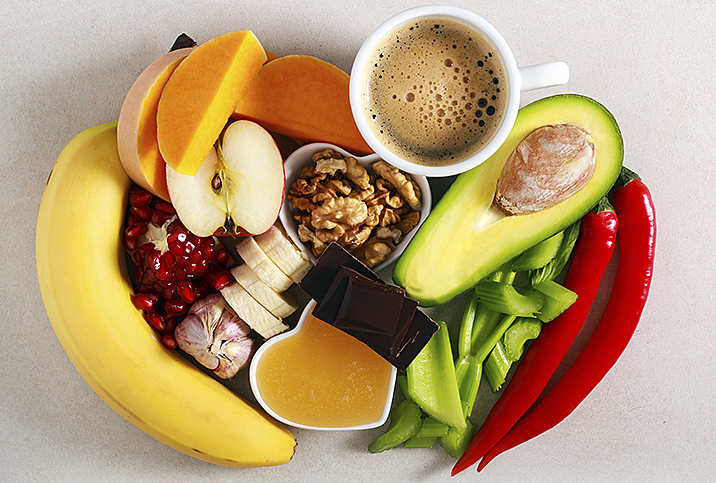Plant-Based Foods for Sexual Health and Libido

The plant world is a cornucopia of health benefits—sexual health included. Increased blood flow and less inflammation lead to optimal sexual health and libido, and a whole foods, plant-based diet low in fat and high in fiber is acknowledged for its anti-inflammatory and cardiovascular benefits. On the contrary, the cholesterol found in animal products (meat, eggs and dairy) clogs arteries, and hormones, like estrogen and testosterone, injected into farmed animals threaten consumers' natural hormone levels.
Another animal product considered an aphrodisiac is oysters, but they can contain harmful toxins. Oysters feed by pulling in and filtering water, so toxins and pollutants, both natural and man-made, are often present and can infect consumers. These risks should not be taken lightly—about 100 people die each year in the U.S. from vibriosis, a bacterial infection linked to the consumption of raw or undercooked oysters and shellfish. Thousands more suffer gastrointestinal upset or, worse, bloodstream infections, skin lesions and even amputations.
Plants aid in sexual health because they are packed with essential vitamins and minerals, such as:
- Zinc, vitamins E and B6, and magnesium (for hormone production)
- Vitamin C and essential fatty acids (for blood flow)
- Vitamin B complex (for stress reduction)
The libido is complex, affected by both biological and psychological factors, such as illness or stress, and all five senses. Plants contain unique aroma and flavor profiles created by terpenes, which have anti-inflammatory and antidepressant benefits. And because scent powerfully triggers memories and affects mood, a plant that arouses one person may not excite another. For example, some people find the scent of vanilla arousing, but for others it brings back memories of their grandma's kitchen—nice, but not exactly a turn-on.
If you are looking to improve your sexual health and libido the natural (and delicious) way, then try out these plant-based whole foods:
Watermelon
Watermelon is casually called the Viagra of fruits because, like the drug, it increases vasodilation, which means it causes blood vessels to dilate and increases blood flow. The melon's secret ingredient is citrulline, an amino acid that converts into arginine, another amino acid, in the body. Both are beneficial to cardiovascular health and blood flow. Along with that, watermelon is a refreshing option for hydration before or after sex.
Pineapple
Pineapple packs a vitamin C punch and contains bromelain, a powerful enzyme credited for giving the fruit its characteristic "bite back." Bromelain has many effects, including reducing inflammation and improving vascular health. While all foods affect the way people smell and taste, pineapple in particular is noted for making bodily fluids taste extra sweet.
Cucumber
In the same family as watermelon, cucumber also contains citrulline and therefore aids in healthy blood flow. Additionally, cucumber contains vitamin C, and its hydrating and cooling effects can help prevent overheating and exhaustion, which could extend performance. The phallic shape is a turn-on for some, too.
Leafy greens
Scientific studies, including one conducted by Egyptian researchers in 2020, indicate a correlation between low folate levels and erectile dysfunction (ED). Leafy greens, like arugula and spinach, are excellent sources of folate and could help improve sexual performance issues.
Roots
Ginger and turmeric provide anti-inflammatory relief, and ginger has traditionally been used to treat erectile dysfunction. Korean ginseng, tribulus and maca have also been used to treat low libido issues caused by menopause.
Cacao
Cacao contains phenylethylamine, the same chemical the brain produces when you are in love, and increases dopamine secretion, boosting feelings of sexual attraction and excitement. Cacao contains tryptophan and serotonin, which elevate mood, and theobromine, which dilates blood vessels. Opt for 100 percent cacao for the most benefits.
Mango
Mango's irresistible flavor and texture make it a truly sensual experience for many, but the fruit is chock-full of nutritional benefits, too. It contains antioxidants, potassium, fiber and vitamins, including vitamins A, C and E. Mango has a cooling effect and is rich in iron as well, so it is recommended for people with anemia and for women during pregnancy or menopause.
Coconut water
Because coconut water is filled with ultra-hydrating and energizing electrolytes, including magnesium and potassium, it is favored by athletes as a natural alternative to sports drinks. If sex is your sport of choice, then coconut water can fuel you through several innings and perhaps help you achieve your personal best.
Avocado
Avocado is made of monounsaturated fats, "good fats," which balance cholesterol levels and improve heart health while providing sustained energy, all good things when it comes to sex. Furthermore, avocados contain vitamin B6 and folate, so the green fruit helps with hormone production and ED.
Strawberry
The most famous fruity aphrodisiac, strawberries, are packed with vitamin C and fiber, which helps balance estrogen levels. Additionally, the berry's appeal to all five senses can ignite desire.
While the above list is a good place to start, numerous other plants improve sexual health and boost libido, too. Some other noteworthy candidates include saffron (elevates mood and physical arousal), asparagus (high folate levels), celery (increases male pheremones), garlic and chile peppers (good for cardiovascular health), and pumpkin seeds, which are loaded with magnesium, zinc, vitamins and good fats.
Because everyone's body chemistry, personal preferences and requirements vary, what works as a sexual health and libido enhancer for one person may not work for another. To make the most out of the perks of plants, pay attention to which flavors, scents, colors and textures arouse your senses pleasurably. Chances are, these are the whole foods that will act as natural aphrodisiacs for you.


















